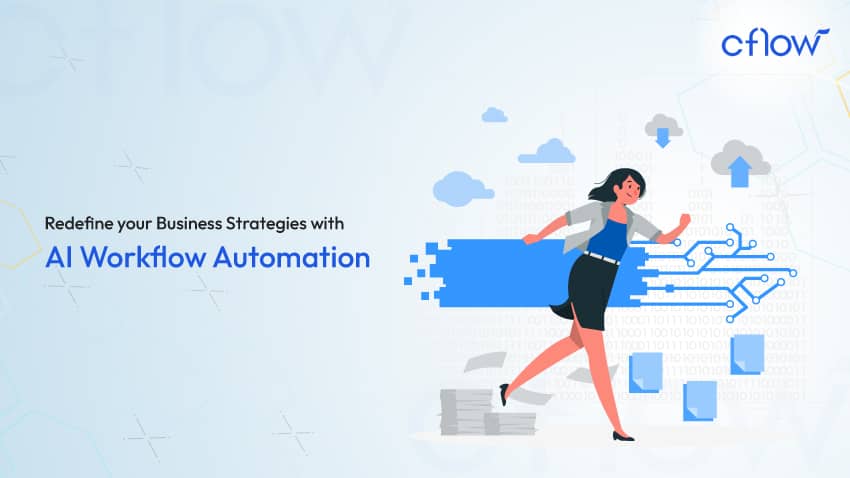
Table of Contents
Efficiency is the cornerstone of success. Enter AI workflow automation—a game-changing technology that streamlines processes, reduces manual effort, and empowers teams to focus on what truly matters. By integrating intelligent algorithms and machine learning, AI workflow automation tools are transforming how organizations operate, offering unprecedented levels of productivity and accuracy. Among the myriad of solutions available, Cflow stands out as a robust platform designed to simplify complex workflows with its intuitive AI-driven features. Whether you’re a startup or an enterprise, leveraging these tools can be the difference between staying competitive and falling behind.
The rise of AI has made it possible to automate repetitive tasks, analyze data in real-time, and even predict workflow bottlenecks before they occur. For teams drowning in administrative work or struggling with siloed processes, adopting AI workflow automation tools isn’t just a luxury—it’s a necessity. Platforms like Cflow exemplify how AI can be harnessed to create seamless, error-free workflows, enabling teams to allocate their time to strategic initiatives rather than mundane tasks.
This article will explore the top 5 AI workflow automation tools every team should consider implementing. From no-code platforms to advanced robotic process automation (RPA) systems, these tools cater to diverse needs and industries. Let’s dive into the solutions reshaping modern workplaces.
Top 5 AI Workflow Automation Tools
1. Cflow
Cflow is a dynamic AI workflow automation tool designed to simplify process management for businesses of all sizes. Its AI-powered engine automates approvals, task assignments, and data routing, reducing human intervention and minimizing errors. With a visual workflow builder, even non-technical users can design custom automation in minutes.
Key Features:
- Drag-and-drop interface for creating workflows.
- AI-driven analytics to identify process inefficiencies.
- Integration with CRM, ERP, and productivity tools like Slack and Microsoft Teams.
- Real-time notifications and automated escalations.
Pros:
- User-friendly for teams without coding expertise.
- Strong focus on compliance and audit trails.
- Scalable for growing businesses.
Cons:
- Limited third-party app integrations compared to competitors.
- Advanced features require a premium plan.
Ideal For: SMEs in finance, HR, or procurement seeking a straightforward, AI-enhanced workflow solution.
2. Zapier
Zapier has long been a favorite for automating tasks across 5,000+ apps. Its recent AI upgrades, like “Zaps Suggestions,” use machine learning to recommend automation based on user behavior.
Key Features:
- AI-generated workflow templates.
- Multi-step “Zaps” for complex processes.
- Conditional logic and filters.
Pros:
- Vast app ecosystem.
- Beginner-friendly with AI-guided setup.
Cons:
- Pricing escalates for heavy usage.
- Limited customization for niche workflows.
Ideal For: Marketing or sales teams managing cross-platform campaigns.
3. UiPath
UiPath dominates the RPA space, combining robotic process automation with AI for tasks like document processing and data extraction. Its AI Computer Vision tool accurately interacts with unstructured data.
Key Features:
- AI-based document understanding.
- Process mining to uncover bottlenecks.
- Cognitive automation for decision-heavy workflows.
Pros:
- Handles complex, large-scale automation.
- Strong governance and security protocols.
Cons:
- Steep learning curve.
- High cost for small teams.
Ideal For: Enterprises in healthcare or logistics needing precision at scale.
4. Monday.com
Monday.com’s Work OS integrates AI to automate project management workflows. Its “Automation Recipes” suggest time-saving actions, like auto-assigning tasks based on deadlines.
Key Features:
- AI-powered project timeline predictions.
- Custom automation for task dependencies.
- Integration with developer tools like GitHub.
Pros:
- Intuitive visual dashboards.
- Collaborative features for remote teams.
Cons:
- AI features are still evolving.
- Expensive for large teams.
Ideal For: Tech or creative teams managing agile projects.
5. IBM Watson Orchestrate
IBM Watson Orchestrate uses conversational AI to automate workflows through natural language commands. It connects to tools like Salesforce and SAP as virtual productivity assistants.
Key Features:
- NLP-driven task automation.
- Pre-built “skills” for common workflows.
- Predictive analytics for resource allocation.
Pros:
- Reduces manual input with AI conversations.
- Enterprise-grade security.
Cons:
- Requires technical expertise for setup.
- Higher pricing tier.
Ideal For: Large organizations prioritizing AI-driven decision-making.
Conclusion:
The future of work is undeniably intertwined with AI workflow automation. Tools like Cflow, Zapier, UiPath, Monday.com, and IBM Watson are not just streamlining tasks—they’re redefining how teams collaborate, innovate, and grow. By automating repetitive processes, these platforms free up human potential, allowing teams to tackle creative challenges and strategic goals.
While each tool has strengths, the best choice depends on your team’s size, industry, and technical maturity. Start with a pilot project, measure efficiency gains, and scale accordingly. Remember, the goal isn’t to replace human ingenuity but to amplify it.







.svg)